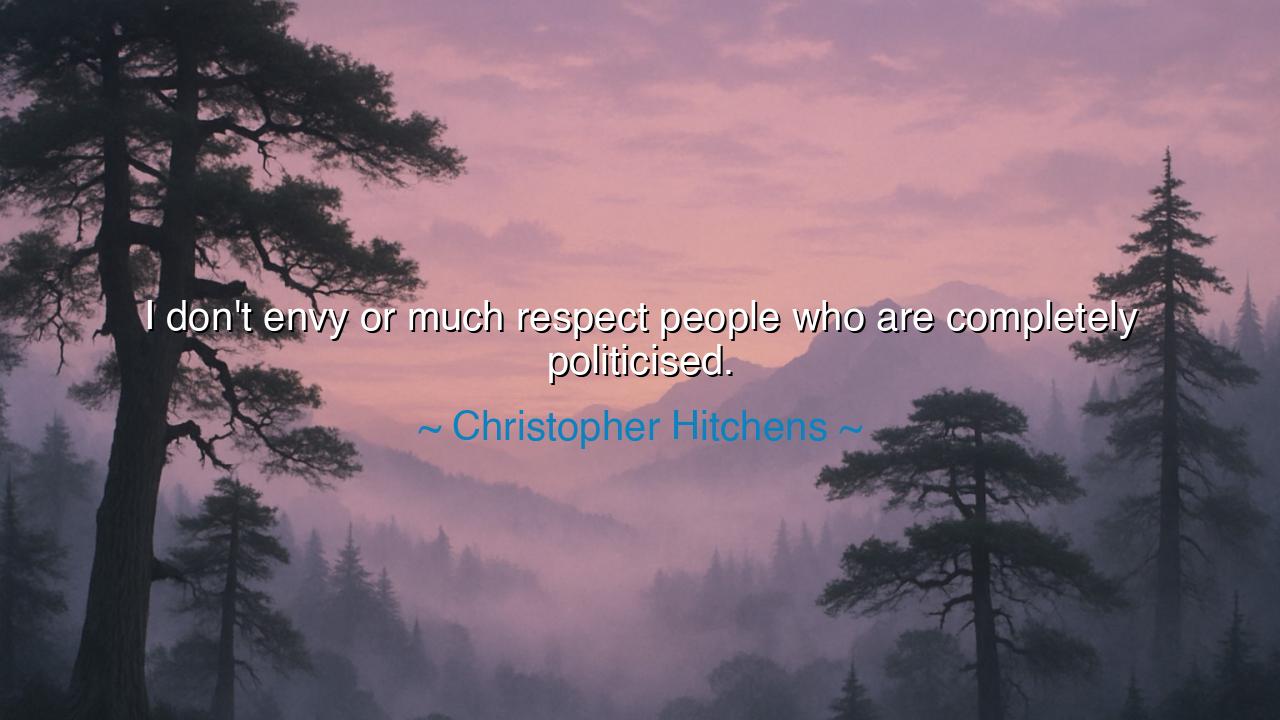
I don't envy or much respect people who are completely






The words of Christopher Hitchens—“I don’t envy or much respect people who are completely politicised.”—strike with the sharpness of a sword, cutting through the illusions of ideology. In them lies a warning against the narrowing of the human spirit, against the surrender of one’s whole being to the rigid machinery of politics. Hitchens, a man who walked among the fire of debates and the storms of public discourse, understood well the temptation of total immersion in ideology. Yet he names it not as strength, but as a diminishment of freedom, imagination, and soul.
The ancients knew this truth. The philosopher Plato, in The Republic, warned that those who fix their gaze only on the shadows of politics may mistake them for reality. A life that is completely politicised leaves no room for love, for beauty, for laughter, for the mysteries of art and philosophy. It reduces the vastness of the human condition to the narrowness of party and creed. Hitchens points to this danger: that when all of life is filtered through politics, life itself is impoverished.
History offers countless examples of this tragedy. Consider the Cultural Revolution in China, when art, literature, and even family bonds were subjugated to ideology. Citizens were judged not by their humanity but by their loyalty to a political creed. The result was suspicion, cruelty, and the destruction of culture. Those who were “completely politicised” became instruments, unable to see beyond the slogans they carried. Their lives were not enriched by politics, but consumed by it. Hitchens, in his own time, saw echoes of this wherever ideology demanded total obedience.
Yet his words also reveal a deep reverence for balance. For politics is not evil in itself—it is necessary, for it governs the order of societies and the justice of nations. But it must not become everything. To respect life is to give room for art, for friendship, for curiosity, for doubt. The person who is consumed by politics loses the breadth of vision that makes one human. They become predictable, their mind a tool of their creed rather than a living flame. Hitchens reminds us that such a life deserves neither envy nor respect.
We may turn, too, to the story of Vaclav Havel, the Czech playwright who became president after the fall of communism. He entered politics not as one already “completely politicised,” but as an artist, a thinker, a man of letters. It was precisely because he had lived in the worlds of art and philosophy that he could resist the suffocating grip of ideology and lead with humanity. Havel’s life proves Hitchens’ point: the most powerful leaders are not those who reduce themselves to politics, but those who remain grounded in the full spectrum of human experience.
The lesson is luminous: beware the prison of total politicisation. Live with conviction, yes; fight for justice, yes; but never surrender your entire being to the narrowness of ideology. Let politics be part of your life, not the whole of it. Nourish yourself with beauty, with love, with the mysteries of existence that no parliament can legislate and no party can own. In doing so, you preserve the fullness of your humanity.
Practical action lies before us: engage in politics, but do not be consumed by it. Read poetry as well as newspapers. Debate fiercely, but also laugh, sing, and break bread with those who disagree with you. When you meet someone who is utterly politicised, recognize that what they have lost is not only perspective but freedom. Do not envy them, as Hitchens warns, for theirs is a smaller world. Instead, strive to live broadly, courageously, with eyes open to the infinite beyond politics.
So let Hitchens’ words be remembered as both critique and counsel: respect belongs not to those who surrender themselves wholly to ideology, but to those who remain free, whose minds are wide enough to hold politics without being imprisoned by it. For such freedom is the mark of true wisdom, and only in wisdom can we live fully, as human beings and not as mere instruments of creed.






AAdministratorAdministrator
Welcome, honored guests. Please leave a comment, we will respond soon